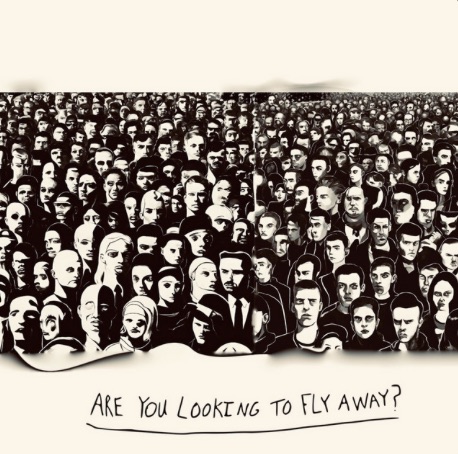“Are You Looking to Fly Away” is an album by Christian Lief, released at the beginning of this year. Lief’s debut album, “Apparatus,” is rooted deeply in alternative rock and is heavily folk-inspired. When considering the sound in “Are You Looking to Fly Away,” Lief throws his art in a more experimental direction, relying on heavier synths, beats and an overall higher production quality. In an interview with Dining Room Records, Lief explains that in past releases, he struggled with the idea of accepting the world as it is. However, in this album, he focuses on letting go of these worries. This album is “About realizing that the world that we are living in is all that we have for now … and being okay with it. Even though there are things that are horrible here, you cannot let that outdo things that are also good,” Lief said.
The opening track, “Himself” immediately sets the tone for the album, introducing the theme of acceptance with a sampled quote from Henry Miller, a renowned novelist and poet. Lief draws inspiration from him, as he said that much of the idea for the album came from an interview between Miller and Ben Grauer, a radio and TV host. Lief samples a line from the interview where Grauer asks Miller why a person would prefer a dangerous and uncertain life to working for someone else. Miller answers: “it is your own life, it is your own misery, it is your own misfortune. The other way, one does not feel himself.” This quote, accompanied by an intense synth beat, serves as a bold declaration of Lief’s departure from his previous sound. “Himself” sets the stage for the album and invites listeners on a journey, embracing life’s uncertainties and finding peace with being true to yourself.
“Fleeting thoughts” deals with Lief’s uncertainties about his place in the world, reflecting relatable fears that often stem from the ever-changing world we live in. The song’s haunting melody accompanies an eerie synth, capturing a sense of unease within the listener. Lief’s lyrics “Scared of who I am / Scared of who I am not / Scared that who I am is just a fleeting thought” encapsulate the struggle of grasping one’s identity.
In “If I’m Alive” Lief confronts his doubts and uncertainties, thematically shifting from “Fleeting thoughts.” Along with a vibrant beat and light acoustic guitar, Lief expresses, “I still don’t know if everything is okay / I still don’t know if I’ll live another day / You might say, don’t spend your life thinking of death or it’s a constant fight.” These lyrics hit deep as Lief grapples with the inevitability of struggle and doubt. However, he ultimately ties these back to the overarching theme of acceptance with the line “But tell me how else will I know if I’m alive.” Struggles and doubts are inevitable factors in our lives. “If I’m Alive” encourages listeners to embrace the complexities of life.
“A-Ok” is the most optimistic song of the album, featuring a carefree whistle matching Lief’s carefree lyrics. This is a pivotal moment where Lief comes to terms with his perspective, accepting its joys and hardships. To end the song, Lief said “Well darling I’m a mess, but I’ll be a-ok … I sure hope one day I’ll change.” These lyrics are vital to remind listeners that while acceptance is essential, it does not overshadow the possibility of personal development. Embracing one’s flaws is crucial for genuine growth and true peace.
The final track, “Never,” pulls back the synths and lets the calming piano fight it out with a sample of breaking glass. Lyrics aside, the instrumentals convey a powerful message. The breaking of glass represents the fragility of our world; however, the graceful piano works through it, representing the peace that can be found through the chaos. As the album draws to an end, the piano gently fades, providing a stark contrast to the aggressive beat that opens the album. This change illustrates a journey of acceptance, culminating in self-peace and understanding.
Lief’s fifth album, “Are You Looking to Fly Away?,” is a beautiful statement on how people are to view the cards they have been dealt. The growing concept of acceptance makes the album a beautiful listen from start to finish, and the ever-changing beats keep the listener fully engaged. Listeners will want some quality headphones for this one
